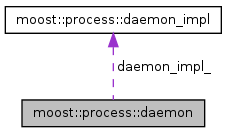Provides everything necessary to convert a process into a daemon. More...
#include <daemon.hpp>

Classes | |
| struct | default_child_init_func |
Public Member Functions | |
| daemon (bool exit_parent, boost::function0< bool > child_init_func) | |
| Forks a child process. | |
| daemon (bool exit_parent) | |
| Forks a child process. | |
| daemon (boost::function0< bool > child_init_func) | |
| Forks a child process. | |
| pid_t | get_pid () const |
| Get the child process ID. | |
| bool | is_child () const |
| Is this process the child? | |
| bool | is_parent () const |
| Is this process the parent. | |
Static Public Member Functions | |
| static void | sleep_forever () |
| Once called, never returns - puts this thread to sleep forever. | |
Private Member Functions | |
| void | init (bool exit_parent, boost::function0< bool > child_init_func) |
Private Attributes | |
| daemon_impl | daemon_impl_ |
Detailed Description
Provides everything necessary to convert a process into a daemon.
You can use this class to fork your process as a daemon. It encapsulates everything that will be required for the OS being targetted via a nice and simple to use interface.
Definition at line 46 of file daemon.hpp.
Constructor & Destructor Documentation
| moost::process::daemon::daemon | ( | bool | exit_parent, |
| boost::function0< bool > | child_init_func | ||
| ) | [inline] |
Forks a child process.
Forks a child process and takes care of everything necessary to make it a daemon. Allows caller to prevent termination of parent and to perform child initialisation.
- Parameters:
-
[in] exit_parent If 'true' the parent will exit without returning [in] child_init_func Called after spawning the child but before performing daemonisation stuff to turn child into a real daemon. Should return a bool, with true indicating all daemonising tasks have been completed or are not necessary so the daemon class will not do these additional daemonising steps.
- Exceptions:
-
If there is an error during the forking a standard runtime_error exception will be thrown.
Definition at line 70 of file daemon.hpp.

| moost::process::daemon::daemon | ( | bool | exit_parent | ) | [inline] |
Forks a child process.
Forks a child process and takes care of everything necessary to make it a daemon. Allows caller to prevent termination of parent.
- Parameters:
-
[in] exit_parent If 'true' the parent will exit without returning
- Exceptions:
-
If there is an error during the forking a standard runtime_error exception will be thrown.
Definition at line 85 of file daemon.hpp.

| moost::process::daemon::daemon | ( | boost::function0< bool > | child_init_func | ) | [inline] |
Forks a child process.
Forks a child process and takes care of everything necessary to make it a daemon. Allows caller to perform child initialisation.
- Parameters:
-
[in] child_init_func Called after spawning the child but before performing daemonisation stuff to turn child into a real daemon. Should return a bool, with true indicating all daemonising tasks have been completed or are not necessary so the daemon class will not do these additional daemonising steps.
- Exceptions:
-
If there is an error during the forking a standard runtime_error exception will be thrown.
Definition at line 104 of file daemon.hpp.

Member Function Documentation
| pid_t moost::process::daemon::get_pid | ( | ) | const [inline] |
Get the child process ID.
- Returns:
- If we're the parent we get the childs pid, if we're the child we get zero.
Definition at line 115 of file daemon.hpp.


| void moost::process::daemon::init | ( | bool | exit_parent, |
| boost::function0< bool > | child_init_func | ||
| ) | [inline, private] |
Definition at line 153 of file daemon.hpp.


| bool moost::process::daemon::is_child | ( | ) | const [inline] |
Is this process the child?
- Returns:
- If child return true else return false
Definition at line 123 of file daemon.hpp.


| bool moost::process::daemon::is_parent | ( | ) | const [inline] |
Is this process the parent.
- Returns:
- If child return false else return true
Definition at line 131 of file daemon.hpp.


| static void moost::process::daemon::sleep_forever | ( | ) | [inline, static] |
Once called, never returns - puts this thread to sleep forever.
A help function that can be called from the 'main' thread of a process to put it to sleep forever so that the "worker" threads can do their thing. Once this is called the only way to terminate the process is to register a quit handler to stop the worker threads and then explicitly call exit().
Definition at line 141 of file daemon.hpp.
Member Data Documentation
Definition at line 164 of file daemon.hpp.
The documentation for this class was generated from the following file:
- /home/mhx/git/github/libmoost/include/moost/process/daemon.hpp
